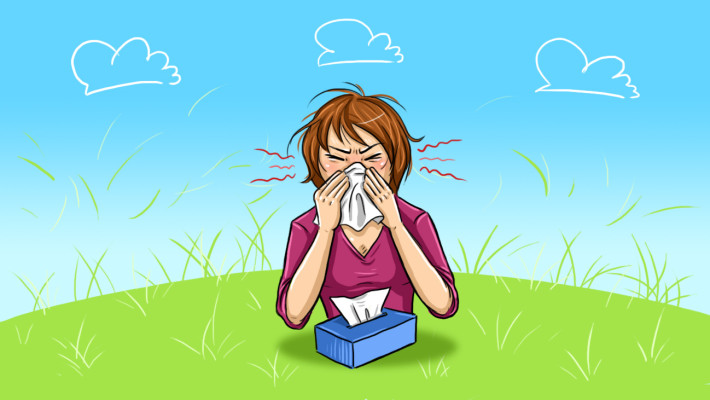
Seasonal Allergies
Spring is when Vancouver comes back to life. The days are noticeably longer, the crocuses and daffodils have been around for a little while now, and the plum and cherry blossoms are starting their annual show that transforms our city streets. Unfortunately, for the approximately 1 in 6 of us that suffer from seasonal allergies, or allergic rhinitis – this spring beauty can be associated with a feeling of dread.
Allergic rhinitis is a hypersensitivity mediated by your IgE antibodies, the same ones responsible for true food allergies (like life-threatening anaphylaxis caused by exposure to peanuts). Allergens (in this case, pollen) bind to these antibodies, causing the release of histamine and other inflammatory molecules stored in mast cells.
The severity of your symptoms depends on a lot of factors outside your control – the type of plants in your area, your particular sensitivities, how early and how long they bloom. Another thing about living in a city – particularly Vancouver – is that city planners typically plant only male flowering trees, to avoid the inevitable fruit and the resultant mess. But the male trees are the ones that produce all the pollen that causes your allergies.
All that aside though, there are also lots of factors that you CAN control, to help minimize your suffering.
- Determine what you are actually allergic to. This can be done by a skin-prick test, where small amounts of different allergens are injected just under the skin. This is very accurate, but it’s limited in how many different substances are available, and how much space you have on your forearm. Another, more complete option is getting a blood test done that measures IgE levels in the blood to allergens. This allows dozens or even hundreds of potential allergens to be assessed with a few milliliters of blood – at Yaletown Naturopathic Clinic, we offer allergy panels specific to the most common species in your area.
- Minimize exposure to the offending substance. As much as you might be tempted to call in sick for the next few months, that’s just not practical. But if you know what you’re sensitive to, the next step is finding out what time of year it’s at its worst, so you can step up your avoidance strategies. Also, pollen counts for most species are highest between 5 and 10 am, so stay indoors if possible during that time. If you have to go outside, face masks can be a very effective (if not the sexiest) option.
- Keep it out of your house. If you have to go out, try not to bring it home with you. Take outer clothes off at the door and put them in the laundry – even running them through a dryer cycle can blow off much of the pollen. Rinse your face well, gargle often, and consider using a neti pot to flush out your sinuses. And be especially careful to keep it out of the bedroom, where you probably spend most of your time when you’re at home. Rinsing your hair before going to bed will keep a lot of the pollen off your pillow.
- Get a good air purifier, with a HEPA filter. At the very least, get a small one for the bedroom.
Even after doing all this, you will probably still experience the symptoms of allergies. But as you know, these symptoms are not all or nothing – sometimes they’re bad, sometimes they’re quite tolerable. So what else might be contributing?
Allergies are a form of inflammation – and if you already have a lot of underlying inflammation, then it doesn’t take much more to push your symptoms over the tipping point. Diet and lifestyle can have a lot to do with it. Smoking, undiagnosed food sensitivities and a diet high in processed foods, refined carbohydrates and trans fats are all major causes of inflammation. In particular, certain foods are high in histamine (that inflammatory molecule at the center of seasonal allergies). Ways to reduce inflammation include moderate aerobic exercise and a diet high in organic fruits and vegetables.
And if after all that you’re still experiencing symptoms, it’s time to sit down with a naturopathic doctor for a personalized treatment plan. This will involve all of the above suggestions, as well as things to support your body’s elimination of the allergens and reduce the severity of the reaction.
Finally – look into long-term treatments to desensitize your allergies. It’s too late to do it for this year, but there are various treatment techniques that act to train your body not to react as violently in the future when it’s exposed to the same species that have tormented you all these years. These treatments include SLIT (Sub-Lingual Immunotherapy), NAET (Nambudripad’s Allergy Elimination Technique), and LDA (Low Dose Allergen) Therapy.
Make an appointment with one of the naturopathic doctors at Yaletown Naturopathic Clinic today, and make this the year you can stop and actually smell the roses!






Leave a Reply
You must be logged in to post a comment.